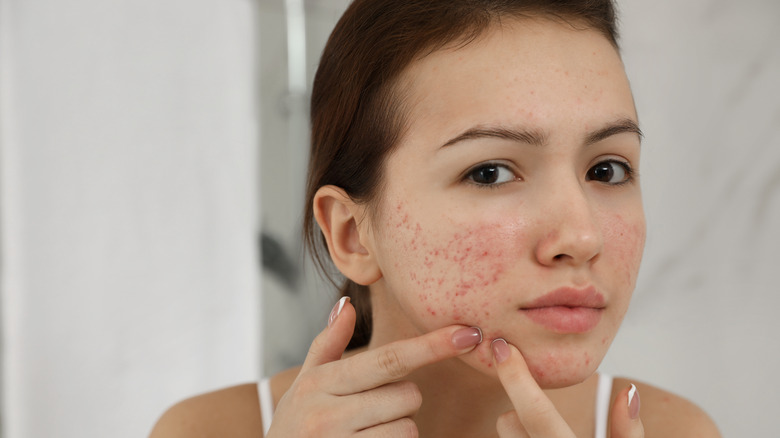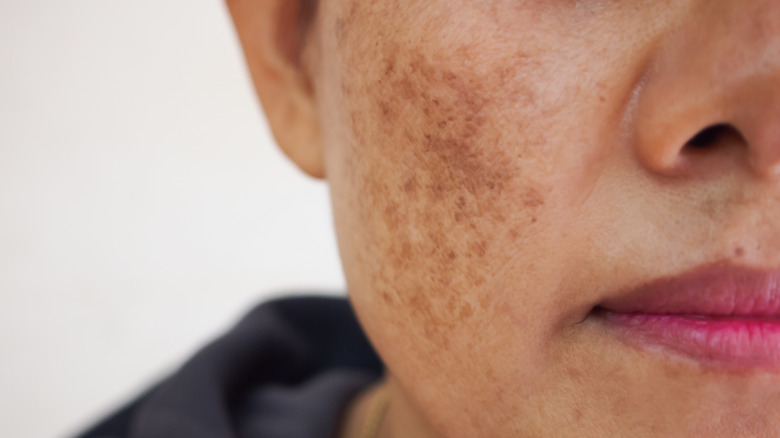What You Need To Know Before Using Vitamin D For Skin Care
Using vitamin D for skin care may protect against photodamage, acne, and inflammation, suggests a 2015 review published in the Journal of Advanced Research. Also known as the sunshine vitamin, this nutrient plays a key role in immune function and overall health. It also helps your body absorb and process calcium, leading to stronger bones.
Most people are aware that maintaining adequate vitamin D levels is crucial for bone growth and development. What you may not know is that vitamin D promotes skin health, too. Its deficiency has been linked to a higher risk of skin disorders, such as vitiligo, psoriasis, and topic dermatitis. Moreover, low vitamin D levels may contribute to the onset of skin cancer, reports the above review.
Your body produces this nutrient when exposed to sunlight. However, this doesn't mean that you need to spend hours in the sun to reap the benefits. Too much sun exposure can affect your skin and speed up aging. Ultraviolet (UV) light exposure may also increase inflammation and cause DNA damage, according to the above review.
The good news is, you only need five to 30 minutes of sun exposure per day to maintain adequate vitamin D levels, says the National Institutes of Health. Dietary supplements and certain foods, such as cod liver oil and fatty fish, can make it easier to prevent deficiencies.
Vitamin D may help prevent and reduce acne breakouts
Calciferol, or vitamin D, is best known for its role in calcium absorption. Low levels of this nutrient may cause your bones to become thin and brittle, warns the National Institutes of Health. The sunshine vitamin also protects against inflammation and regulates cell growth. As you probably know, inflammation and acne go hand in hand.
Clinical evidence suggests that acne is an inflammatory disease, notes a 2013 research paper featured in the The Journal of Clinical and Aesthetic Dermatology. As the scientists note, acne-related inflammation manifests itself as papules, pustules, and small blemishes called microcomedones. The latter are invisible to the naked eye and tend to occur in the early stages of acne.
Due to its anti-inflammatory effects, vitamin D may help prevent and reduce acne breakouts. Individuals with low vitamin D levels are more likely to develop this condition, according to a 2016 study published in PLOS One. Nearly half of all subjects with acne were deficient in this fat-soluble nutrient. As the researchers point out, vitamin D not only fights inflammation but also protects against acne-causing bacteria.
Maintaining adequate vitamin D levels may slow down aging
Photodamage, a process caused by exposure to ultraviolet light, can lead to premature aging. Repeated sunlight exposure affects the structure and appearance of your skin, resulting in freckles, wrinkles, spider veins, and red, scaly spots. Over time, your skin may lose its elasticity and develop deep creases, warns the Canadian Dermatology Association.
Current research indicates that vitamin D may prevent photodamage and reduce photoaging (via the Journal of Advanced Research). While its mechanism of action isn't fully understood, scientists believe that it increases the release of metallothionein, a class of proteins with antioxidant activity. This nutrient also decreases inflammation and facilitates DNA repair, which may further slow the aging process (via the Journal of Steroid Biochemistry and Molecular Biology).
The sunshine vitamin may protect against inflammatory skin diseases, too. A 2018 review published in Skin Pharmacology and Physiology suggests that vitamin D may help in the treatment of atopic dermatitis and psoriasis. Researchers attribute these potential benefits to its anti-inflammatory and immunomodulating effects.
How to use vitamin D for skin care
Now that you know more about the benefits of using vitamin D for skin care, you may wonder how to get more of this nutrient. First of all, make sure you don't exceed the recommended daily dosage, which is 15 micrograms per day (per the National Institutes of Health). However, these guidelines vary among health organizations. If you're not sure how much vitamin D you need for healthy skin, discuss your options with a dermatologist.
Vitamin D can be obtained from food or supplements. One tablespoon of cod liver oil, for example, provides 170% of the recommended daily intake, according to the National Institutes of Health. Salmon, trout, fortified milk, and soy milk are rich in vitamin D, too. Older adults and people with dark skin are at higher risk of developing deficiencies and may benefit from taking vitamin D supplements (via the National Institutes of Health). The same goes for those who spend a lot of time indoors, live in cold climates, or have Crohn's disease or other conditions that limit fat absorption.
Since vitamin D is fat-soluble, it's best to take it with fatty foods for maximum absorption. If you have acne or psoriasis, your dermatologist may prescribe topical vitamin D. Over-the-counter skin care products with vitamin D are unlikely to work, says Nikhil Dhingra, MD (via Byrdie). Instead, he recommends using prescription creams or spending 10 to 15 minutes in the sun daily to reap the benefits.



